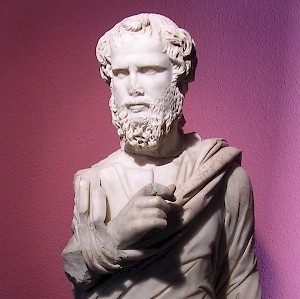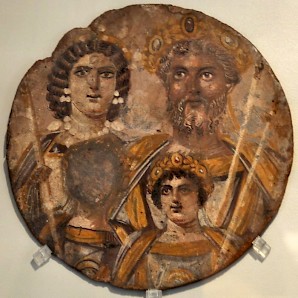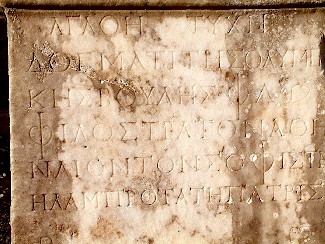Philostratus
Lucius Flavius Philostratus (c.170-c.247): one of the leading sophists or orators of his day, spent some years at the Roman imperial court, author of a Lives of the Sophists and an intriguing Life of Apollonius of Tyana.
Philostrati

Almost all facts about Philostratus' life have to be deduced from his own writings. Unfortunately, several relatives were also called Philostratus and were published authors as well. Confusion is, therefore, likely, and we must first establish which Philostratus is responsible for what publication. A short catalogue of surviving works:
- Philostratus I (father; second half of the second century)
- Nero, a dialogue on the emperor with the same name - maybe written by Philostratus II.
- Philostratus II ("our" Philostratus; c.170-244/249)
- Eight books containing a Life of Apollonius, a vie romancée of the charismatic teacher Apollonius of Tyana, commissioned before 217;
- Two books of Lives of the Sophists, a collection of biographies of Greek orators from the second century CE, written in the 230s or early 240s;
- Gymnasticus, an essay on sport, completed after 220;
- Heroicus, a dialogue on the heroes of the Trojan War;
- Two books of Imagines, a description of several pictures at an exhibition, in which the orator tried to improve on the painter's work;
- Love letters, a collection of fictional letters;
- Other letters, including one to Julia Domna, the wife of the emperor Septimius Severus.
- Philostratus III (son-in-law; first half of the third century), surnamed the Lemnian
- An open letter on epistolography, addressed to Aspasius of Ravenna, the secretary of Greek letters of the emperor Caracalla (or Severus Alexander?).
- Philostratus IV (grandson)
- A second collection of Imagines (incomplete).
- Philostratus of Athens
- A historian who described a plague in the third quarter of the third century and the Sassanian attack on Roman Syria in 260.
- Another Philostratus is mentioned by Dexippus in an account of a battle of a Roman army against the Goths, in 254, at Thermopylae
The second of these men is the subject of the present article.
Philostratus' life
He was born in or about 170 CE, probably on the isle of Lemnus, one of the overseas' territories of Athens; in his writings, he indicates that he spent a part of his youth at the island. From an inscription we can deduce that his full name was Lucius Flavius Philostratus, a threefold name that means that he had the Roman citizenship.
His father, Philostratus I, sent his son to Athens to study rhetoric under Proclus of Naucratis. In these days, he must have started his career as a sophist, i.e. an orator whose speeches were a form of entertainment. People came to the theater or odeon to listen to the performances of these virtuoso "show speakers", who delivered improvised declamations on subjects suggested by the audience (more...).

In the first decade of the third century, Philostratus was the hoplite general of Athens, a very important function. After this, he moved to Rome, where he may have given sophistic performances. Between June 203 and 208, the orator was introduced to the court of the emperor Septimius Severus (193-211), his wife Julia Domna and their sons Caracalla and Geta. Philostratus now belonged to a cultural coterie of philosophers and sophists, and the empress was to be his patron until her death in 217.
In the last years of his reign, Septimius Severus was obliged to go to Britain to fight against the Picts, tribesmen living in modern Scotland. Philostratus appears to have accompanied the royal family, because in his Life of Apollonius he offers an eyewitness account of the Ocean tides. During the war, the emperor fell ill and died in York. He was succeeded by his sons Geta (211) and Caracalla (211-217). Philostratus stayed at the imperial court. His Lives of Sophists contains an aside on the murder of Geta by his brother.
Together with the remaining emperor and his mother, Philostratus traveled to the east, where Caracalla was involved in important diplomatic negotiations with the Parthian empire. On their way to the east, the imperial court visited Tyana (in modern Turkey), where a temple was dedicated to the charismatic teacher Apollonius. Maybe it was on this occasion that Julia Domna commissioned Philostratus' Life of Apollonius. The vie romancée was finished during the reign of Severus Alexander.
The sophist was married to one Aurelia Melitene - she is known from an inscription - and they had at least two sons, one called Capitolinus, and a daughter. The latter married to Philostratus III, who may or may not have been the son of a brother of Philostratus II. The son-in-law is known to have been the priest of Hephaestus on Lemnus and was a successful orator too; his father-in-law and uncle calls him "Philostratus of Lemnus". Shortly before or during the emperor's voyage to the East, which took place in 215, this Lemnian Philostratus received a tax exemption after a fine declamation before Caracalla.
During the winter, the royal family went to Alexandria. It is unclear whether Philostratus II was in their company. What is certain, is that he spent some time in the great city of Antioch, where he met one Marcus Antonius Gordianus Sempronianus, who was to be emperor in January/February 238 (Gordian I). Philostratus dedicated his Lives of the sophists to this man.
In 217, Caracalla was murdered and succeeded by the commander of the imperial guard, Macrinus. Julia Domna realized that her life was in danger and committed suicide. It is unclear what became of the sophists and philosophers she had protected, and we have no idea what happened to Philostratus. He is mentioned in a medieval text under the name "Philostratus of Tyre" and it is possible that he stayed for some time in this Phoenician city.

He must have returned to Athens, however, where he moved in the leading cultural and political circles of Greece. His Life of Apollonius was published, followed by the Lives of the sophists (in 237). The Athenians dedicated a statue to "the sophist Flavius Philostratus" in Olympia and honored a relative with the rank of hoplite general in c.225. The inhabitants of Erythrae honored the family by choosing his son Capitolinus in the same office. Several members of the Philostratus family, including a son and at least one grandson, were members of the Roman Senate.
No doubt "our" Philostratus saw the son of his daughter and Philostratus III, the above mentioned Philostratus IV. But he did not live to see a relative become major of Athens in 255/256, because he had died during the reign of the emperor Philippus Arabs (r.244-249).
Life of Apollonius
In the Life of Apollonius, Philostratus tells the story of Apollonius of Tyana, a charismatic teacher and miracle worker from the first century CE who belonged to the school of Pythagoras. (A summary of this work can be found here.) It is an apologetic work, in which Philostratus tries to show that Apollonius was a man with divine powers, but not a magician. He also pays attention to Apollonius' behavior as a public speaker (quote).
Although the hero is known from other sources, Philostratus' vie romancée is our most important source. Scholars studying the life of the Tyanaean sage - whose miraculous acts have often been compared to the miracles of Jesus of Nazareth - have tried to establish the sources of Philostratus' books in order to come as close as possible to the historical truth.
The most important question is whether Philostratus used the notes by Apollonius' disciple Damis. Skeptical classicists and historians have tried to argue that "Damis" is a literary fiction. Recently, Jaap-Jan Flinterman has convincingly argued that there must have been a pseudo-biography of pythagorean character. His arguments are:
- Philostratus refers to "Damis" to support information which he cannot concile with his own attitude towards magic.
- The information ascribed to "Damis" presupposes a conflict between pythagoreanism and the cynical school of philosophy, a rivalry that was important in the second century CE, but not in Philostratus' own time.
- One episode in the Life of Apollonius, the sage's meeting with the Indian brahmans, shows a conception of the relationship between sages and kings of which there is no evidence in Greek literature on India before the third century CE. A pseudo-biography of pythagorean character is an extremely viable explanation for the inclusion of such a conception in a work by an author like Philostratus.
To these arguments can be added:
- Damis correctly describes Babylon as a living city; Philostratus cannot have found this information in a more common Greek or Roman text, as these all state that it was in ruins. The same can be said for Nineveh.
- In those parts of the Life of Apollonius that are attributed to Damis, the author shows himself to be aware of the Alexander historians, especially Nearchus. However, in those parts that are clearly Philostratus' own, he manages to ignore remarkable sites like Gaugamela and Choara, although his heroes actually pass along these sites.
A further discussion of the Life of Apollonius can be found here.
The lives of the Sophists
The two books are dedicated to a proconsul named Gordian. This man was emperor in January/February 238, which makes it almost certain that the Lives of the Sophists were finished in 237, because the proconsulship was a magistrature only briefly kept.
Lives of the sophists is an amusing collection of gossip about the famous sophists of the late first, second and early third centuries. Philostratus also tells us about their technical capacities, and is one of our most important sources for the study of the history of ancient rhetorics. He distinguishes two ages of "the art of speaking":
- The first sophistic, which was founded in the fifth century BCE by Gorgias
- The Second Sophistic, founded by Aeschines in the fourth century, but eclipsed for centuries "because there were no decent speakers" (in which line "decent" means "well to do")
Philostratus allots much space to the sophist Polemo of Laodicea (90-145) and his Athenian colleague, the billionaire Herodes Atticus (101-177). The author of the Lives of the sophists does not aim to be complete, but offers a lot of entertaining anecdotes and literary criticism.
Literature
- On the second sophistic, one may consult the books by Maud Gleason, Making men. Sophists and Self-Presentation in Ancient Rome (1995), Simon Swain, Hellenism and Empire. Language, Classicism and Power in the Greek World, AD 50-250 (1996 Oxford), and Tim Whitmarsh, The Second Sophistic (2005 Oxford).
- Ludo de Lannoy discussed how the philostratean publications should be attributed to the four Philostrati in "Le problème des Philostrate (État de la question)" in Aufstieg und Niedergang der Römischen Welt 2.34.3 (1997) 2362-2449.
- Another important discussion of Philostratus' writings and the Life of Apollonius can be found in a book by Jaap-Jan Flinterman, Power, paideia & pythagoreanism. Greek identity, conceptions of the relationship between philosophers and monarchs and political ideas in Philostratus' Life of Apollonius (1995 Amsterdam).